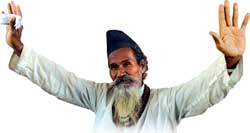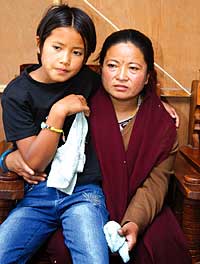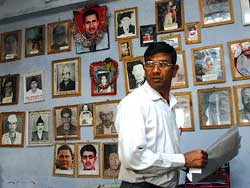 Last year, Ram Gopal Tamauli was shot and stabbed by a group of Maoists after he refused to join their movement in a village in Banke.
Last year, Ram Gopal Tamauli was shot and stabbed by a group of Maoists after he refused to join their movement in a village in Banke. He tried to argue that he did not believe in violence, but was attacked with swords and guns. Emboldened by his courage, hundreds of villagers pounced on the Maoists and killed two of them. Ram Gopal was bleeding profusely from his wounds and was rushed to Bheri Hospital in Nepalganj where he collapsed on arrival. "I thought I was dead," says Ram Gopal, showing his scars. "I don't know how I survived."
After that incident, the villagers of Tamauli asked Ram Gopal to leave because they feared the Maoists would return. And they did. About 500 Maoists came back and killed Ram Gopal's uncle, Motilal Tamauli, and beat a neighbour, Sohan Yadab, to death. They tied up hundreds of villagers and made them watch the torture of three young boys. Their legs were placed on rocks and crushed
 "What kind of revolution is this?" asks Ram Gopal, who abandoned his shop and homestead to live as a refugee in Kathmandu. His wife, three sons and parents are destitutes in Nepalganj. Ram Gopal has now joined the Maoist Victims' Association (MVA) and says there is nothing to do but to find strength in numbers.
"What kind of revolution is this?" asks Ram Gopal, who abandoned his shop and homestead to live as a refugee in Kathmandu. His wife, three sons and parents are destitutes in Nepalganj. Ram Gopal has now joined the Maoist Victims' Association (MVA) and says there is nothing to do but to find strength in numbers. But it hasn't been easy for Maoist victims even in the capital, and their association suffered a severe blow when Maoist assassins killed their president, Ganesh Chiluwal outside his office on 15 February, two days after he led a procession where effigies of Maoist leaders were burnt. Dharma Raj Neupane is a Nepali Congress worker who had to flee his village in Accham after 200 Maoists surrounded his house and were looking for him. "I was lucky to get out alive," says Dharma Raj, who has now taken over from Chiluwal as president of the MVA. Last Friday, Dharma Raj received a death threat from the Maoists and was warned to close the office. "We are not afraid anymore," Dharma Raj told us. "We have nothing left but our courage and pride."
 Despite Chiluwal's assassination, anyone can walk in and out of the MVA's office in Bagh Bazar. Requests for government security have been made, but the office hasn't even been assigned a constable. For Ram Gopal Tamauli, this is proof that officials have no interest in protecting the victims of Maoists. "We have given up expecting anything but apathy from the government," he says. A local NGO is paying the rent for the office and members have been forced to beg for donations in the streets from pedestrians and shops. After the Chiluwal murder and threats, MVA has got 100 new members, bringing the total number to 6,000.
Despite Chiluwal's assassination, anyone can walk in and out of the MVA's office in Bagh Bazar. Requests for government security have been made, but the office hasn't even been assigned a constable. For Ram Gopal Tamauli, this is proof that officials have no interest in protecting the victims of Maoists. "We have given up expecting anything but apathy from the government," he says. A local NGO is paying the rent for the office and members have been forced to beg for donations in the streets from pedestrians and shops. After the Chiluwal murder and threats, MVA has got 100 new members, bringing the total number to 6,000. "The government has established camps and rehabilitation centres for the Maoists who surrender but it has not bothered about us," says 76-year old Kul Bahadur Khatri from Dang, who came to Kathmandu this week after he was nearly killed by his own son, who is a Maoist. Khatri is heartbroken that his three sons have become supporters of the same group that abducted and tortured him four years ago after he refused to pay them Rs 300,000. He was abducted again this year but managed to escape at night. He walked for two days from Salyan to Nepalganj where he had started begging on the streets. An army officer helped him, and put him on a bus to Kathmandu where he is now living with friends.
 Like other Maoist victims, Kul Bahadur has given up all hope of help from the government. "Even human rights activists are not speaking for us," he says. "All they do is raise their voices against the state. What about us and those responsible for the violation of our rights?"
Like other Maoist victims, Kul Bahadur has given up all hope of help from the government. "Even human rights activists are not speaking for us," he says. "All they do is raise their voices against the state. What about us and those responsible for the violation of our rights?" Displaced families and Maoist victims line up at the association office every day hoping to get some money, but all it can do is give them moral support and solidarity. "How much longer can we live like this?" asks a tearful Hira Gurung, who fled her village in Khotang. Hugging her nine-year old daughter, Hira tells us how her husband was killed during a meeting three years ago. The next day, the Maoists announced they would also kill her for being an informer. Leaving behind all her family property, Hira fled to Kathmandu with her five children and is now living with distant relatives.
Ram Gopal Tamauli and other members of the association approached Home Minister Kamal Thapa recently for assistance and protection, and have been assured help. "We wonder when the government will do anything for us," says Ram Gopal with a sigh. "Maybe after we are all dead."
Resister killed
 he government's move to arm villagers against Maoist rebels suffered a setback with the killing of the chairman of the Peace, Security and Good Governance Committee in Chulachuli village of Ilam district, Chetan Raj Bantaba (pic). He was gunned down in broad daylight in Damak on 23 March, and the suspected Maoist assassins even took away the pistol Chetan Raj was given by the army.
he government's move to arm villagers against Maoist rebels suffered a setback with the killing of the chairman of the Peace, Security and Good Governance Committee in Chulachuli village of Ilam district, Chetan Raj Bantaba (pic). He was gunned down in broad daylight in Damak on 23 March, and the suspected Maoist assassins even took away the pistol Chetan Raj was given by the army. It was the same pistol he had used to defend himself when the rebels had attacked him three months ago. After his death, his wife and three daughters are now left to fend for themselves. "They had been repeatedly sending death threats to my husband," Chetan Raj's wife, Tika Maya, said.
With Chetan Raj dead, the 13-member Maoist-resistance committee he set up is now leaderless. Committee members aged 13-65 go on regular patrols around the village, sometimes even joining the unified command under the army. Chetan Raj formed the committee last November following Prime Minister Surya Bahadur Thapa's announcement that the government would arm civilian volunteers who wanted to resist the Maoists.
Members of the committee in Chulachuli village had been receiving arms and weapons training, and Chetan Raj Bantaba used to say the arms were for self-defense and not to kill the rebels. "Our guns are not to kill anyone, they are to defend ourselves," he would explain. Even before the government provided them arms, the villagers here used to carry homemade guns to resist the rebels' influence. Lately, Chetan Raj's armed civilian volunteer group was involved in a controversy after the chief of Damak Municipality lodged a complaint alleging that he was involved in timber poaching.
(Dambar Krishna Shrestha in Ilam)


